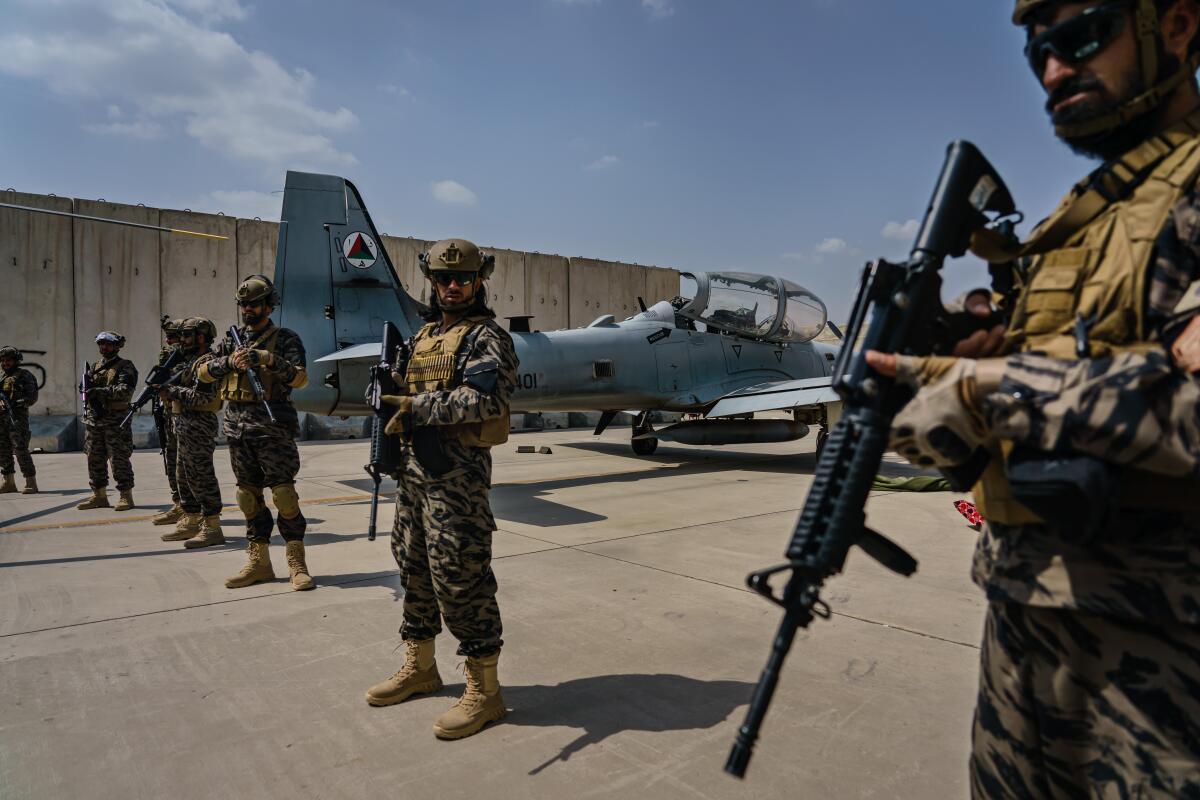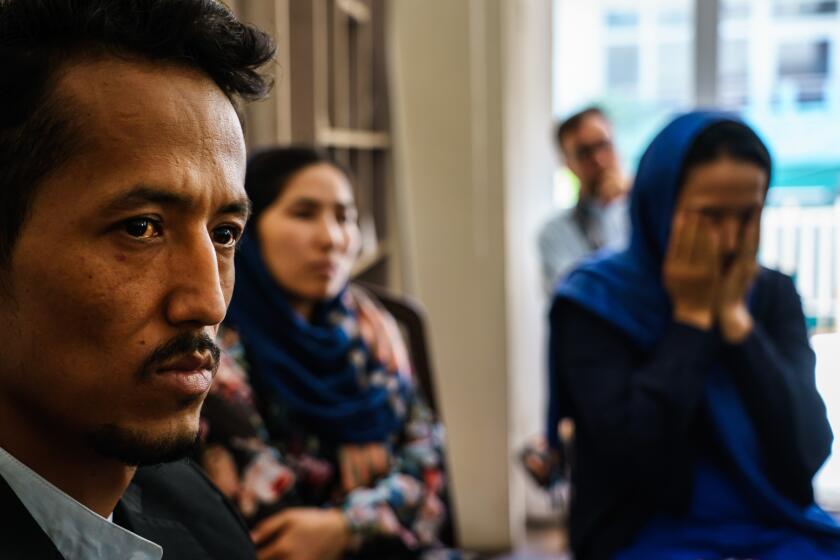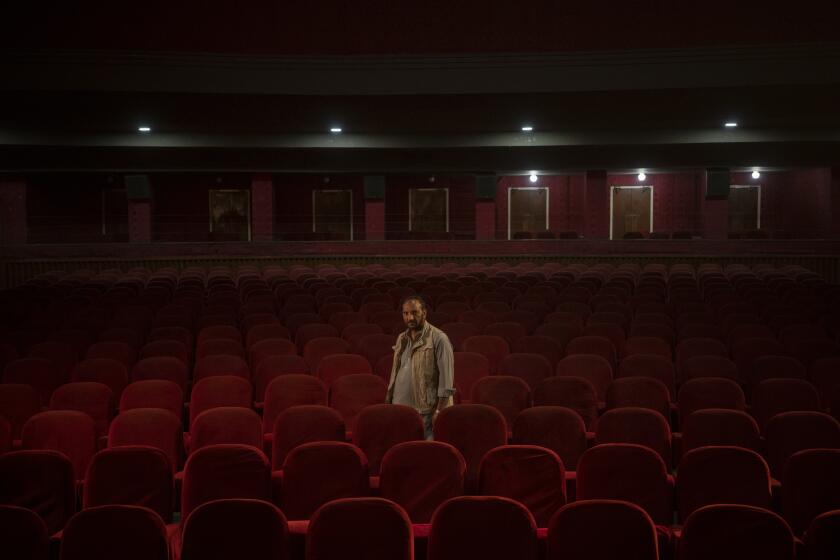Taliban has killed or abducted scores of former police and intelligence officers, rights group says

- Share via
KABUL, Afghanistan — Taliban fighters have summarily killed or forcibly “disappeared” more than 100 former police and intelligence officers since taking power in Afghanistan, Human Rights Watch said Tuesday in a report highlighting continued retaliation against the armed forces of the ousted government despite an announced amnesty.
Taliban forces have hunted down former officers using government employment records and targeted those who surrendered and received letters guaranteeing their safety, the report said. In some cases, local Taliban commanders have drawn up lists of people to be targeted, saying they committed “unforgivable” acts.
“The pattern of killings has sown terror throughout Afghanistan, as no one associated with the former government can feel secure they have escaped the threat of reprisal,” Human Rights Watch said in the report.
The Taliban seized power Aug. 15 when they swept into the capital, Kabul, as Afghanistan’s internationally backed government collapsed. Kabul’s fall capped a stunningly swift takeover by the insurgents, who had taken a string of cities as U.S. forces and their allies withdrew from Afghanistan after nearly 20 years of war.
Since then, the Taliban has been struggling to deal with the collapse of the country’s economy and has faced an increasingly deadly insurgency by Islamic State extremists.
Taliban forces have targeted people they suspect of supporting Islamic State in eastern Nangarhar province, an epicenter of Islamic State attacks, the report said. In the province’s capital, Jalalabad, a fierce eight-hour gun battle erupted Tuesday when Taliban fighters raided a suspected Islamic State hideout, witnesses said. Provincial intelligence chief Tahir Mobariz said that during the fighting, a woman and a man in the house detonated suicide vests, dying in the blasts, and a third person was killed by gunfire. Two suspected militants were arrested, he said.
Aug. 31 marked the closing of the chapter on a 20-year U.S. intervention that ended the way it began: with the Taliban in control of Afghanistan. Here’s full coverage of the situation.
The Taliban leadership has repeatedly announced that workers of the former government, including members of the armed forces, have nothing to fear from them. Former army officers have said they were ordered to give up their weapons, and in return they received a document confirming their surrender and ensuring their safety.
On Saturday, Taliban Prime Minister Mohammed Hassan Akhund denied in a public address that any retaliation was taking place.
When the Taliban took over, “they announced amnesty for all. Has there been any example of this?” he said, referring to retaliation. “There is no problem for anyone.” But he added that if any former security officer “resumes his bad deed ... then he will be punished based on his crime.”
Human Rights Watch said the promised amnesty has not stopped local commanders from retaliating against former members of the army, police and intelligence services.
Emal Salarzai helped teach elite Afghan troops. Now his parents are on the run from the Taliban, and he can’t find any way to aid them in escaping.
“The burden is on the Taliban to prevent further killings, hold those responsible to account and compensate the victims’ families,” said Patricia Gossman, the organization’s associate Asia director.
Through interviews with witnesses, relatives, former government officials, Taliban officials and others, Human Rights Watch said it had documented the killings or enforced disappearance of 47 former armed forces members in four provinces between Aug. 15 and Oct. 31. It said its research indicated that at least another 53 killings or disappearances took place.
The research focused on Ghazni, Kandahar, Kunduz and Helmand provinces. “But the cases reflect a broader pattern of abuses” reported in other provinces, it said.
Taliban fighters have carried out night raids on homes to detain former security officers or threaten and abuse their relatives into revealing their whereabouts, the report said. In multiple cases that it documented, the bodies of those who had been taken into detention were later found dumped in the street.
The gates of Kabul’s historic Ariana Cinema are shut and the movie posters have been stripped from its marquee under Afghanistan’s new Taliban rulers.
While some “opportunistic” killings took place immediately after the Taliban takeover, “killings and disappearances appear to have become more deliberate since then as Taliban commanders ... have used informants and information from the previous government to locate others” linked to the former armed forces, it said.
In one case cited by the report, a former fighter in the National Directorate for Security named Abdul Qadir went into hiding in Kunduz province after the government fell, then resurfaced to live with his in-laws. On Aug. 25, he was stopped at a checkpoint by Taliban fighters. He acknowledged having been an NDS member, but pointed out the amnesty. The fighters detained him anyway, and three days later his body was found by a river.
In Ghazni province, a former local police commander named Saadat disappeared after going to the market in mid-October. Residents later brought his body to his home, telling relatives he had been killed on the road by armed men who they believed were Taliban fighters.
The Taliban leadership in September announced the creation of a commission to investigate reports of rights abuses and crimes by their own fighters. But the commission has so far announced only the arrests of a few members for theft and the dismissal of others for corruption, Human Rights Watch said.
“The Taliban’s unsupported claims that they will act to prevent abuses and hold abusers to account appear so far to be nothing more than a public relations stunt,” Gossman said.
More to Read
Sign up for Essential California
The most important California stories and recommendations in your inbox every morning.
You may occasionally receive promotional content from the Los Angeles Times.













